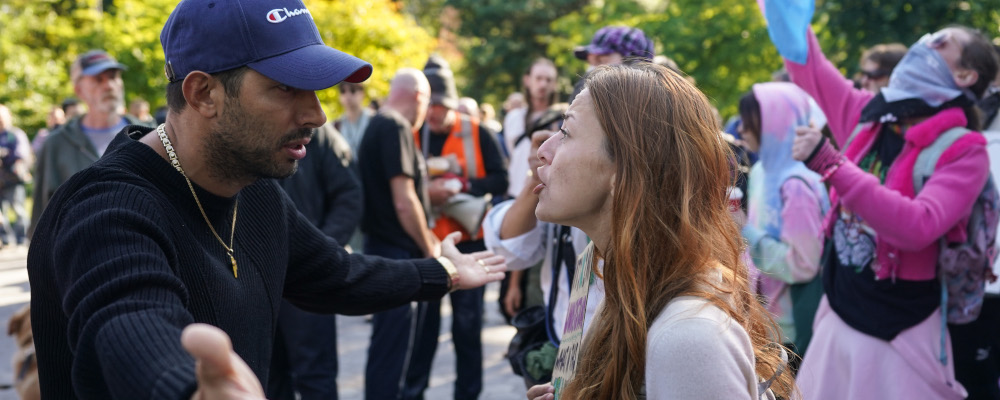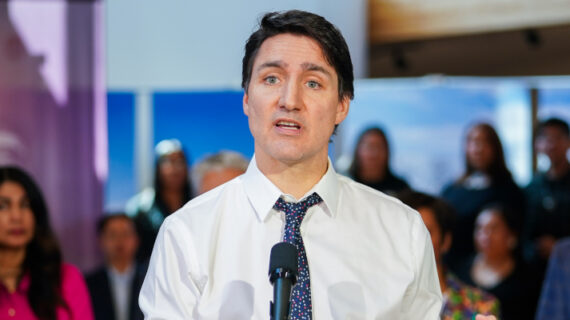In recent weeks, The Hub has touched on the ideological capture we are witnessing on university campuses across North America. In response to our commentary, a senior administrator at a Canadian university approached us to share their serious concerns about the state of Canadian higher education. Fearing they would lose their job if their views were attached to their name, The Hub has extended them the rare courtesy of anonymity. This is not something we do lightly. The Hub’s editors felt given the circumstances that they deserved the ability to speak their mind without worrying about professional costs including potentially losing their livelihood.
If you’re plugged into today’s academic world, you will know that 2023 ended with a bang. The presidents of Harvard, MIT, and Penn testified before Congress about their institutions’ relation to antisemitism in the aftermath of the Hamas terror attacks on Israel on October 7th. Not one of the presidents would unequivocally say that calling for the genocide of Jewish people was against their institutions’ anti-bullying policies. Ironically, in defending their tolerance of hate-filled rhetoric on their campuses the presidents waved the flag of free speech, which has been notably absent in recent years.
Rather than justifying their actions, their appearances revealed to the public the corruption that too few of us within post-secondary institutions have identified as a pernicious problem, or have actively spoken out against. The presidents revealed the singularity in acceptable thought that undermines the purpose of the university. When I was a student in the late 1980s and early 1990s, faculty and students together grappled with the complex issues of the time, in the context of the tradition of the human quest for knowledge and truth. That time is over. The new truth has been revealed and you had better be on board.
It is a new calendar year and I wonder whether the increased scrutiny on our universities is a cause for optimism. Is the Canadian university environment finally approaching peak “wokeness”? Unfortunately, I find myself maudlin as I contemplate returning to work as a senior administrator at a highly regarded Canadian university after a welcome Christmas holiday break. Based on my projections, the lingering impacts of EDIA (Equity, Diversity, Inclusivity, and Accessibility) policies and identity politics will be ingrained within our post-secondary institutions for a full tenure cycle, at a minimum.
The autumn term was tough. Who am I kidding? The last four years have been difficult. As someone who cares about free speech and diversity of thought, the decidedly illiberal environment and monolithic thinking that govern my workplace—and most Canadian universities with which I am familiar—are discouraging. From the students to the tenure-track faculty, and from the sessional teachers to the senior administration, the concerns and priorities have changed significantly since I secured my first university job 30 years ago. There were signs of trouble brewing during the past three decades, but our decline has accelerated dramatically.
During the pandemic period, we established an expectation that our universities would comment on the news and matters of public interest. In the wake of George Floyd’s death, university presidents made statements in support of Black Lives Matter (BLM). Presidents publicly mourned the “discovery of mass graves” of Indigenous children at residential school sites, critiqued the January 6th “insurrection,” expressed concern for the safety of transgender and gender non-conforming students during the “1MillionMarch4Children” this past fall, and feted other progressive causes—all to the approbation of faculty, students, and staff. Yet when BLM’s financial irregularities became public, or when no mass graves materialized, or when the march was led by non-white, religious parents concerned about public schools sexualizing young children, there were no further comments or retractions.
Many Canadian universities, mine included, have been under pressure from members of faculty to make statements in favour of Palestine or, at a minimum, call for a ceasefire. These have been resisted by most institutions, though not by all students and faculty unions. On the other hand, there are some who questioned the universities’ silence about the violent attacks by Hamas when issues that are minor in comparison supposedly warranted comment. This shift in approach is noticeable and hopefully will continue. Universities should be neutral places that encourage discussion and debate. As historian Niall Ferguson said recently on Jordan Peterson’s podcast, “Universities are not newspapers. They should not have an opinion page.”
George Floyd became a call to action for many universities, mine included, to do more to right historic injustices. According to progressives, these injustices defined our universities. There was an accelerated push to hire faculty who represented traditionally marginalized identity groups. These new appointments prioritize an ideological commitment to decolonizing the academy and embracing intersectional considerations over field or subject matter expertise. These are the same ideals that Harvard’s Claudine Gay, one of the presidents who testified before Congress, built her entire career on. Gay was since accused of multiple instances of plagiarism in addition to supporting antisemitic speech, yet retained her position with the support of the university’s board. She’s now resigned, but the message appeared to be that in the modern university, ideology trumps academic integrity.
Here in Canada, events on campuses often feature a territorial welcome from an Indigenous elder. At meetings, we have replaced the school prayer with a land acknowledgment. Not only is the acknowledgment read, but the reader must then share a personal insight into their own journey to understand the importance of decolonization. In my province, these acknowledgments reimagine the historical reality of the treaties between the British and Indigenous Peoples. Despite the embedded inaccuracies, it is not hard to find someone who is eager to participate in this new ritual and demonstrate their allyship.
Our administration has become bloated with specialists hired to support students who we believe are too helpless to endure the rigours of university because of their race or identity. We are to ensure that we are increasing the numbers of these students regardless of their aptitude, interests, and academic qualifications. Segregation is back on campus, with programs and services offered exclusively to Black, Indigenous, and other students of colour. This consumes an outsized portion of strained university budgets and space. Each group needs its own supports. We spend time in leadership meetings discussing whether to use the acronym “BIPOC” or “IBPOC” because one puts Black issues first, and the other prioritizes Indigenous concerns. Which group is more important in the Canadian context? We are very serious about intersectionality.
Many of these EDIA administrators lack an understanding of university operations and have no previous experience in this environment. Still, they are not shy about making recommendations about how graduation should operate, what type of academic accommodations should be granted to students, how curriculum, assessment, and testing might “harm” students, or how and to whom scholarships and bursaries should be awarded. Fortunately, most of these administrators don’t last long at my school, as they move on to larger institutions that offer bigger salaries and more staff support. A recent hire with a portfolio that includes EDIA responsibilities uses any hint of independent thinking as a potential teaching moment, preferably in meetings or group emails. It is inconceivable to this colleague and others that the truths they hold to be self-evident are not embraced by everyone.
My husband tells me to keep my head down. He is afraid I will lose my job and all the benefits earned over a career in increasingly senior roles. While I understand and share his concern, I find it hard to stay quiet while watching what I see as the decline of institutions that have made significant contributions to the development of Canada. How did we end up in this place where fear governs my workplace and my home? The initial concessions were easy to make, but each was followed by escalating demands. Is it unreasonable to call someone by their preferred pronouns? No. Still, we have arrived at a time and place where she/he pronouns are disappearing from conversation and, with them, comprehensibility. Nearly everyone puts their pronouns (and land acknowledgments) in their email signatures. Is it unreasonable to include female authors in a reading list that was historically dominated by male thinkers? Probably not. Yet today we are replacing scholarly integrity with “different ways of learning and knowing” in both arts and sciences, including applied science.

The Hub has suggested that government can influence a return to the traditional Enlightenment priorities that shaped universities. It is true that Canadian universities receive large portions of their budgets from governments. But rather than helping us return to a better environment, government funders are also contributing to the dominance of EDIA considerations in universities. Federally, for example, Social Sciences and Humanities Research Council, Canadian Institutes of Health Research, and Natural Sciences and Engineering Research Council of Canada grants for academics and Canada Council for the Arts grants (visual, performing, literary) are oriented towards addressing contemporary concerns such as equity and decolonization. Applicants are encouraged to demonstrate how their work or research affirms and supports these priorities, regardless of the field.
As far as I can tell, I am the only member of the senior leadership team who is not on board with the ideology that guides our decision-making. It is scary and lonely. Most presidents in Canada rose to their positions because of their talent for negotiating complex environments—working with faculty, students, government, donors, and community partners. They have advanced through this period of change in the universities and support the contemporary priorities publicly. They speak of “best practice” when justifying policies that seem counter to the traditional understanding of university life. I know there are board members at my school and other institutions who share my concerns. They do not speak up because the progressives, who increasingly populate university boards as part of our push for equity, are intimidating and unwilling to consider more traditional views about university education. Volunteer board members are understandably uninterested in risking their careers and reputations to fight a battle they cannot win.
Universities in the so-called “global West” have been engaged in what is, in my opinion, the progressive “race to the bottom.” Conformity and accessibility, rather than debate and excellence define today’s university. As the public becomes more aware of what is happening in these elite institutions, there may be some incentive to change. The process will be slow because the new ways are so ingrained in academic scholarship and administrative structures. In the United States, the University of Austin and Ralston College have been established to recreate the traditional university learning environment, but this is a limited solution to a much larger problem. Recent high-profile university president resignations also provide some promise for new “best practices” to emerge in the sector. In the future people like me might be emboldened to speak up without hiding behind the veil of anonymity.
Despite the chilling climate at my school, I survive. My victories are small—refusing to share my pronouns, avoiding land acknowledgments, and cautiously suggesting other approaches. Mostly I focus on what I can control which is doing my job well. I am grounded by the university’s mission which, miraculously, has not been brought fully into the present. Over the holidays I was talking with a former colleague who is considering early retirement from the university where he has taught for over two decades. He said, “I don’t recognize my institution.” And I realized something sad: neither do I.




